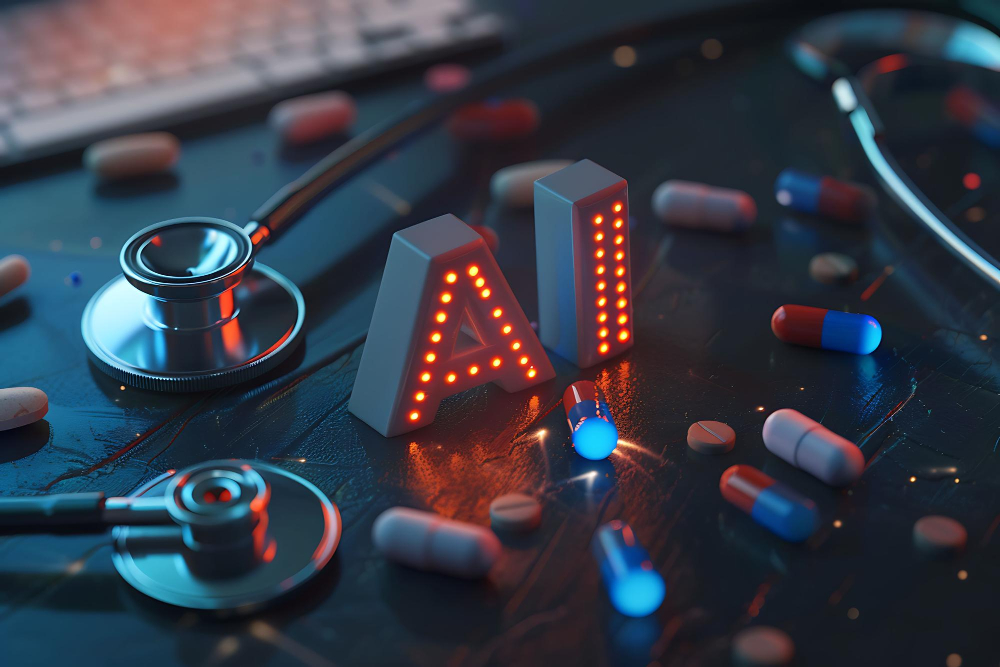- Blog
- January 22, 2025
How AI Models are Shaping the Future of Medicine

- Blog
- January 22, 2025
How AI Models are Shaping the Future of Medicine
The integration of artificial intelligence (AI) in healthcare has revolutionized various aspects of medicine today, be it diagnostics or personalized treatment. One of the most promising AI advancements is the generative models, which have shown tremendous potential in reshaping the future of healthcare. These models, driven by machine learning algorithms, generate new data, simulate complex biological processes, and even aid in drug discovery.
In this blog post, we will explore how generative models are transforming the healthcare industry, with a special focus on their application in diagnostics, drug discovery, personalized treatment, and medical research. Thereby improving outcomes and making medical services more accessible and efficient.
Applications of Generative Models in Healthcare
1. AI-Driven Diagnostics
AI-driven diagnostics have become a cornerstone of modern healthcare. Generative models enhance diagnostic capabilities by synthesizing medical images, improving image resolution, and even detecting anomalies in medical scans. For example, GANs can be used to generate high-quality MRI images from low-resolution scans, helping radiologists identify issues more accurately.
Moreover, generative models can simulate disease progression, allowing doctors to predict how a condition might evolve. This is particularly useful in managing chronic diseases such as cancer, diabetes, and cardiovascular disorders.
2. Drug Discovery and Development
Drug discovery is a time-consuming and expensive process. Generative models are revolutionizing this by accelerating the identification of potential drug candidates. Traditional methods involve years of laboratory research and clinical trials, but generative models can simulate millions of chemical compounds and predict their interactions with biological targets in less time.
One notable example is the use of Variational Autoencoders (VAEs) to design novel molecules with desired properties. By analyzing existing drug data, these models can suggest new compounds that are more likely to be effective and safe. Additionally, reinforcement learning can be combined with generative models to optimize the drug discovery process further.
3. Personalized Medicine
Personalized medicine treatment offers tailored plans to individual patients by analyzing their genetic, environmental, and lifestyle factors. Generative models play a crucial role in simulating patient-specific outcomes and optimizing treatment protocols. For instance, these models can analyze a patient’s genetic profile to predict their response to various medications, enabling doctors to prescribe the most effective drugs with minimal side effects.
Additionally, generative models can design personalized nutritional plans, enhancing overall health. Also, they allow healthcare providers to move beyond a one-size-fits-all approach, delivering more precise and effective treatments tailored to individual needs.
4. Enhancing Medical Research
Medical research relies heavily on data, but real-world clinical data is often limited due to privacy concerns and regulatory restrictions. Generative models can create synthetic datasets that preserve the statistical properties of real data without compromising patient privacy.
These synthetic datasets can be shared across research institutions, facilitating collaboration and accelerating innovation. Furthermore, generative models can simulate clinical trial scenarios, helping researchers design more effective studies and predict potential outcomes.
Challenges and Ethical Considerations
While generative models hold immense potential in healthcare, several challenges and ethical considerations must be addressed:
- Data Privacy: Ensuring synthetic data does not inadvertently expose sensitive patient information.
- Model Bias: Prevent biases inherited from training data, which could lead to inaccurate or unfair outcomes.
- Regulatory Compliance: Securing rigorous validation and regulatory approval to ensure AI-driven solutions meet healthcare standards.
- Interpretability: Enabling medical professionals to understand and trust how AI models generate their conclusions.
Effectively addressing these challenges is essential for fostering trust and ensuring the widespread adoption of generative models in healthcare.
Future Prospects: What Lies Ahead?
The future of AI in healthcare is exceptionally promising. As generative models continue to be deployed, several key developments are anticipated:
- Enhanced Predictive Analytics: AI will improve the accuracy of models forecasting disease outbreaks and patient outcomes, enabling proactive healthcare measures.
- Accelerated Drug Discovery: Generative AI will expedite and reduce the cost of developing new therapies by efficiently analyzing complex biological data.
- Personalized Telemedicine: AI-driven virtual consultations will offer real-time, tailored medical advice, enhancing patient engagement and access to care.
- Automated Clinical Workflows: AI will streamline hospital operations by automating administrative tasks, allowing healthcare providers to focus more on patient care.
Integrating AI with emerging technologies like the Internet of Things (IoT) and blockchain will further enhance healthcare services, making them more efficient and secure.
Generative models are at the forefront of healthcare innovation, offering new possibilities for diagnostics, drug discovery, personalized treatment, and medical research. By harnessing the power of AI in healthcare, we can improve patient outcomes, reduce costs, and make healthcare more accessible to all.
However, it is crucial to navigate the ethical and regulatory challenges associated with these technologies carefully. With continued research, collaboration, and responsible implementation, generative models can truly shape the future of medicine, bringing us closer to a world where personalized, precision healthcare becomes the norm. Reach out to MSRcosmos for cutting-edge Generative AI services and solutions that drive innovation in healthcare.




